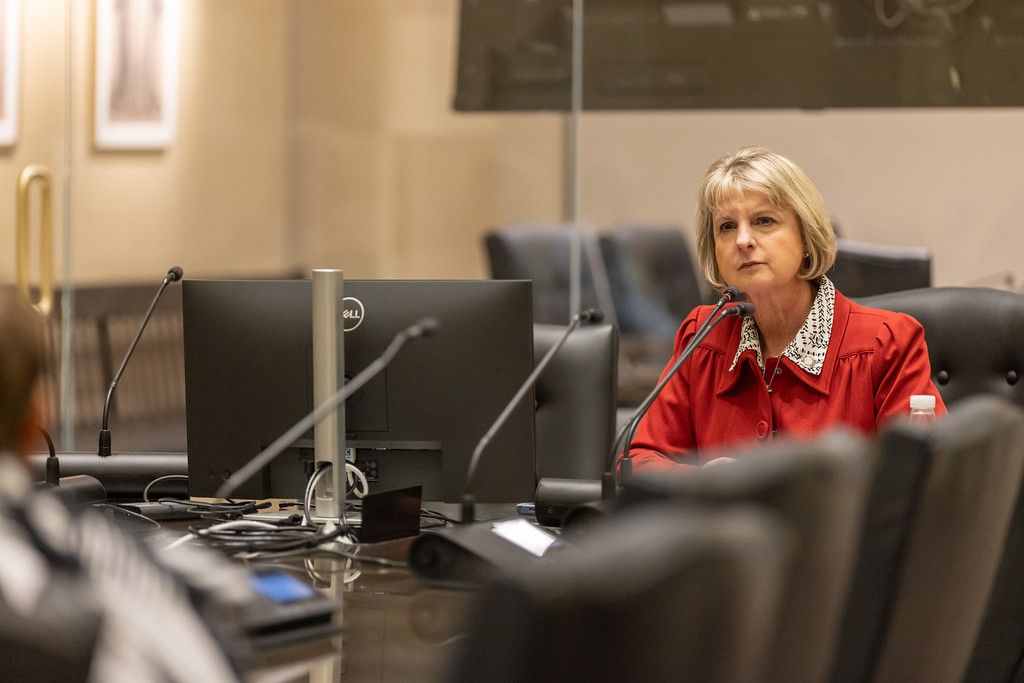House Studies Property Tax Reform

OKLAHOMA CITY – Lawmakers, veterans, those representing seniors and the aging, tax experts and others gathered Tuesday before the House Appropriations & Budget Finance Subcommittee to discuss property tax reform.
The combined interim study was requested by Reps. Denise Crosswhite Hader, R-Piedmont, and Tammy Townley, R-Ardmore.
"Many of us have heard lots of concern about people being priced out of their homes due to rising property taxes," Crosswhite Hader said. "There are some functions government has to fund, but we wanted to bring people together to discuss current law and where we might improve, especially for our veterans and senior citizens."
Townley added, "We know this is a big topic and very in-depth. We're so grateful for everyone who joined us for this study. We know that if we do reduce ad valorem in any way in one area, we have to determine how to replace that money to continue vital services for all Oklahomans. At the end of the day, we just want to do better for all Oklahomans."
Study attendees first heard from retired U.S. Air Force Brig. Gen. Stanley Sieg, a 100% disabled veteran. He shared his personal experience with receiving and then losing the veterans' property tax exemption when he moved mid-year within the City of Edmond.
He said he was unaware his exemption would not automatically follow him. He was able to work with his county tax assessor to reapply for the exemption and reconcile the amount of back taxes for which he was billed. He asked lawmakers to consider changes in the law to make the exemptions portable or to at least improve communication with Oklahoma taxpayers.
Matt Wehmuller, the county assessor for Canadian County, explained that property tax is the largest source of local funding, with 85% going to public education, and 15% going to counties for public safety and other local services, including administration. Property taxes, however, are not used for county roads and bridges.
Dr. Brad Ward, deputy state director of Americans for Prosperity, showed data exposing the rising burdens of property tax within Oklahoma as opposed to the surrounding region.
Ward said while Oklahoma's current property tax rate is competitive with surrounding states, coming in third, the state's rising rate is actually the fastest growing in the region. That is alarming, he said. He suggested some of this might be due to efforts the state made to standardize property valuations among the state's 77 counties, causing a spike for those that had been under valuation for years. Another factor is school bond elections – 43 passed in 2023 and 15 of 19 passed a month ago.
Another presenter, Kerry Ross, the county assessor for Carter County, said litigation cases against cities and counties also can play a role in rising property tax rates.
Doug Kellogg, state projects director with Americans for Tax Reform, said rising home values are significant as well.
Jim Randall, chairman of the Oklahoma State Council on Aging, asked if it's time to bring all parties together to take a comprehensive look at the state's tax structure to see what is equitable for everyone. He said property owners, specifically seniors and others on a fixed income, should be protected from rising costs, while acknowledging local services do need to be funded.
Wehmuller explained how property taxes and exemptions are calculated, discussing how annually capping tax increases at 3% and 5%, depending on the type of property owned, until full-market value is reached, protects property owners even more than the standard $1,000 homestead exemption.
He also explained the difference between exemptions and freezes and how those who have had their property taxes frozen can still be impacted by large bond elections or litigation.
Kellogg shared Florida's zero-income tax structure and a ballot question to remove property tax. He said Florida is known as one of the most tax friendly states in the nation, getting most of its funding through sales and excise taxes. They've also adopted a truth in taxation, or truth in millage, policy that requires public hearings and input before new taxes are assessed.
Telling taxpayers clearly when their taxes are going up and where the money will go is essential, he said.
State spending is another key, Kellogg said. If local governments had kept spending in line with population growth and inflation, they would be in much better shape today. He ended with a warning against giving local governments a tax revenue source that local voters did not approve.
Corey Jager, tax policy manager with the Oklahoma Tax Commission, rounded out the day's discussion with an overview of property tax exemptions, freezes and credits and estimated revenue impacts for changes for seniors or veterans.
Much of property tax law is enshrined in the state's Constitution and therefore would require a vote of the people to change.
Yager also discussed the loss of revenue that would occur if property tax were eliminated and gave some alternative funding suggestions, including the possibility of taxing services not currently taxed.
The full study can be viewed here.
